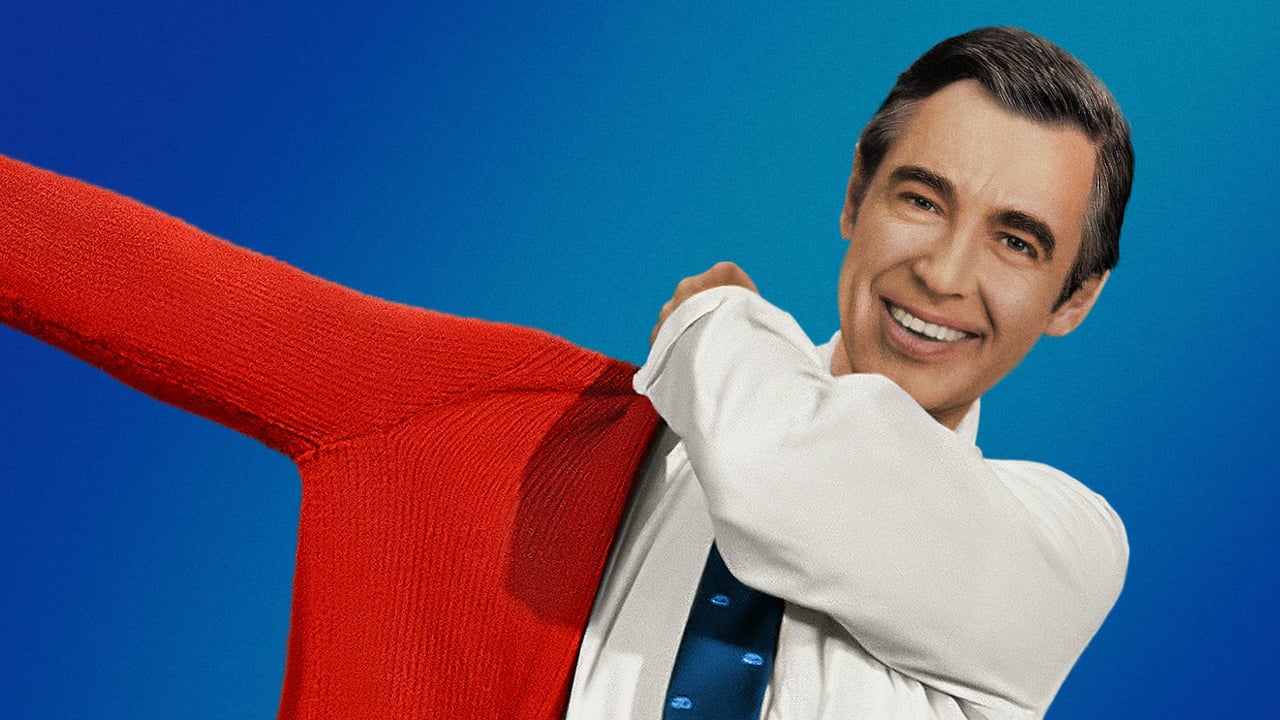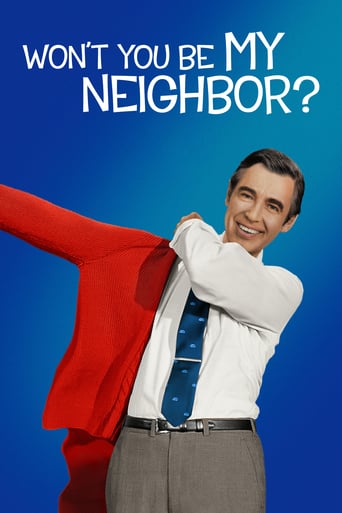

There have been many great children's programs on television, some from the same era; "Sesame Street", "The Electric Company", "Romper Room", "Captain Kangaroo" were some that I grew up with. One of the most beloved through the decades was the one hosted by Fred Rogers known as "Mr. Rogers' Neighborhood". A new documentary looks at his career as one of the most iconic figures on television. "Won't You Be My Neighbor?" might be nostalgic for some, surprising to others but to everyone who sees it the film it should be one of the greatest joys on film in a long time. Rogers was trained to be a Presbyterian minister and about to become ordained when he announced to his family that he was going to produce children's programs on the local Pittsburg television station because he was displeased with the way television addressed children at the time. He felt that cartoons and other children's shows were too silly and just trying to entertain kids instead of reaching out to them and truly speaking to them. His first show Rogers simply produced and left the hosting duties to Josie Carey although he did puppeteering on the show and provided their voices. These puppets like King Friday XIII, Queen Sara Saturday (named after his wife), X the Owl, Henrietta Pussycat and Daniel Stripèd Tiger would become staples on his own show, "Mister Rogers' Neighborhood" which began on February 19, 1968. Rogers wasn't afraid to tackle tough subjects like death, bigotry, divorce, and war. Although the series was aimed primarily at preschool ages 2 to 5, it was labelled by PBS as "appropriate for all ages" and many older children enjoyed watching Mr. Rogers. His message was simple; be kind to others and believe in yourself. His soft-spoken demeanor was often parodied but there wasn't a more powerful voice on television that spoke to the soul. Although he wasn't educated on the subject (although his show did use child phycologist as consultants), he became one of the leading voices in child development. For 31 seasons Fred Rogers invited us into his home and to the Neighborhood of Make-Believe. This film is a celebration of his career. You didn't have to grow up with Mr. Rogers to appreciate this film or to be touched by Rogers message, but if you did you will be overcome with nostalgia and warmth of seeing him again. Its really interesting to see that one of his biggest motivators for doing the show was that he truly hated television, or at least how it spoke to kids. A fact that is repeated often in the film. The film also touches on many of the myths and urban legends about the man. Was he a Navy Seal or Marine? Was his iconic sweater worn to cover tattoos? Was he gay? Even his political beliefs (it was amusing to hear the audience that I watched this with gasp when it is revealed that Rogers was a lifelong Republican, as if that is impossible to believe). It also shares some of his most famous moments like when he appeared before the United States Senate Subcommittee on Communications to get government funding for PBS. In one of the most memorable moments of the documentary, Rogers is visibly nervous when he is called upon to speak. Democratic Senator John O. Pastore, who was chairman of the committee has already admonished several witnesses for reading prepared speeches and not convincing the committee that the funding was needed. Many felt that the proceedings were going horribly for those looking for the funding and that PBS would not get the funds. Pastore tells Rogers "Alright you have the floor" in an ominous tone, as if there was nothing that he could say that would change their mind. Rogers states that he had a 10-minute statement prepared for the committee (something the other witnesses bored the committee with) but will trust that the chairman will read it later as he promised. Senator Pastore sarcastically interrupts Rogers saying "Will it make you happy if you read it?". Rogers then begins to speak spontaneously from his heart talking about his show and what he tries to do with "Mister Rogers' Neighborhood", the message of caring for others. Rogers then recites a song from the show that deals with controlling anger and emotions. Pastore was not familiar with Rogers' work but was obviously drawn to Rogers and moved by his testimony admitting that it had given him goosebumps, and declared, "I think it's wonderful. Looks like you just earned the $20 million." The subsequent congressional appropriation, for 1971, increased PBS funding from $9 million to $22 million. Another wonderful scene is his introduction of Jeff Erlanger to his viewers, a boy who uses a wheelchair due to his disability. Rogers was a champion in the belief of diversity and loving everyone, even those who are different than what we are used to. (Stay during the credits to see his reunion with Erlanger many years later during Rogers induction into the Television Hall of Fame in 1999) There are many other heartwarming moments and revelations that the documentary shares and I can promise you, you will be moved. Fred Rogers was a special human being that we need today, more than ever. It seems that many of his messages have been forgotten but perhaps if people see this wonderful documentary they will be touched by them & try to be kind to others and more tolerant and his legacy can truly be memorialized.
... View MoreHaving watched Mr. Rogers on television as a child, I knew going in that this documentary would bring back memories. Some of the show I remember quite well. But for the most part, my memory of Mr. Rogers and his neighborhood was so foggy and so distant, that this film at times felt like a re-acclimation and one that I'm glad I made. You are reminded that everyone has a place in Mr. Rogers' neighborhood. What made him so wholesome was that he viewed the world as big enough for everyone and his show conveyed that always.Mr. Rogers' show and its revolutionary philosophy is laid out in thorough and thought-provoking detail. He wanted to have a close, but forthright relationship with children, teaching them as much hard reality about the world as possible but in a way that never fostered cynicism or fear. In this regard, Mr. Rogers was truly a miracle. How he viewed the world from children's eyes and how he sought to introduce them to the world, warts and all, ironically made Mr. Rogers seem far more grown up than most famous or non-famous people I have seen in my life. You will surely get that sense after watching this.What makes this film so genuine and so bittersweet is that it reminds us how wondrous Mr. Rogers' point of view on life was and yet how challenging it is to adhere to a hopeful, positive outlook in today's world that has become so anguished. Is this aspect of television and culture going to become a relic? Is it already? I hope not. But I'm glad I got to see it for myself as a child and I'm especially grateful that this film reminded me of it. Enthusiastically recommended.
... View MoreI went into this film with barely a passing knowledge of Mr. Rogers, motivated not by nostalgia but an affinity for a well-made documentary on an interesting subject. Won't You Be My Neighbor? succeeds on both fronts. Mr. Rogers is a fascinating individual and the film's strongest suit is its excellent exploration of the uniqueness of his program within the television landscape of the era. As a huge fan of Hayao Miyazaki and the films of Studio Ghibli, it was hard not to see some parallels between their visions: patient, often quiet, meaningful entertainment for children with a focus on substance over saturation. The battle that Mr. Rogers took up against the brainless, loud, mile-a-minute, overstimulating children's programming of the time feels just as relevant today with so many mainstream kid's films feeling vapid and hurried.So too, his message of unconditional acceptance. And given the fervor through which he flew that flag, it struck me as odd that the film shied away from a deeper exploration of the clash between his Christian values and his employment of least one gay actor (and friend) on the show. It was touched upon that Rogers insisted that this man remain closeted and even find a wife should he wish to continue on the show, a revelation which shook the film only to be brushed over. Having done some reading afterward, I've learned that he eventually withdrew from this stance when this actor's marriage eventually failed and ultimately encouraged him to find a male partner and live his life openly. Given that this was the lone point of contradiction in Rogers' ethos mentioned in the film, it felt quite awkward that it wasn't given more attention.Otherwise, the film did a fine job of exploring his character, particularly in the ways he manifested himself within the puppet characters on the show. Peppered throughout were also a handful of animated sequences depicting key themes and experiences of his childhood which gave context to the person he would become. There were still some missed opportunities for deeper exploration, particularly through his son and sister whose presence was very limited despite the unique perspective they must've had on the man.Nitpicks aside, Won't You Be My Neighbor? is a strong documentary that entertains, educates, and inspires.Strong 4/5
... View More"He was a minister...but he didn't wear a collar, he wore a sweater." I've heard it said that Fred Rogers must've been an angel, or even the second coming of Christ. This thinking is dangerous; it relieves us of our responsibility as humans. If he's a God, then we can just admire; if he's human, we must aspire. The movie is a cathartic blanket, and when Daniel the Tiger sings the duet with Lady Aberlin, the crying is constant from there on out. A soothing balm of sincerity and hope for scary and cynical times.
... View More